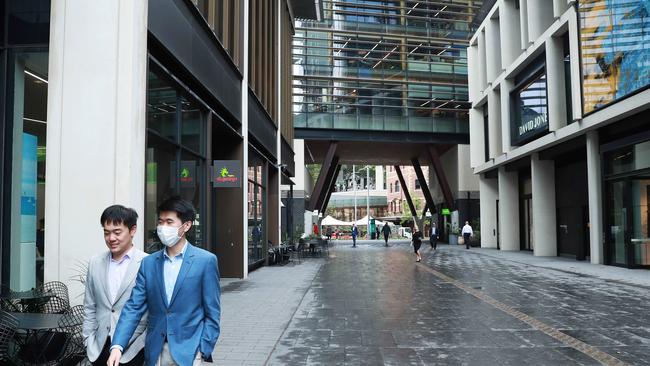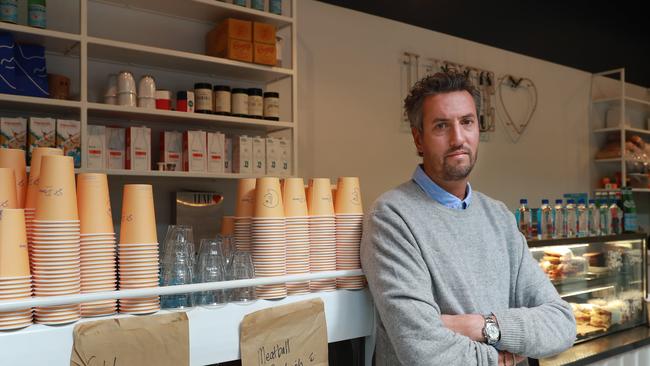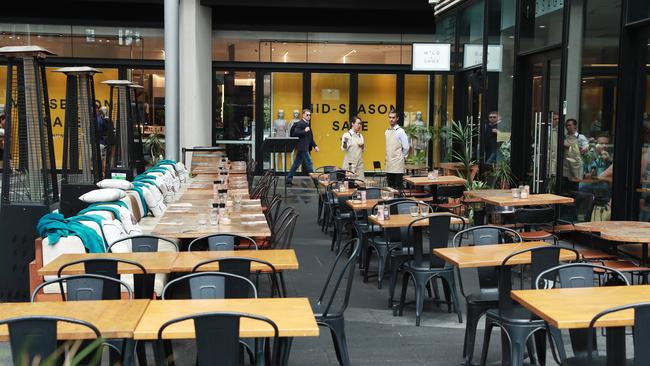Sydney’s financial hubs deserted as workers sent home
Sydney’s financial hubs have been left deserted as multiple office blocks conduct a corporate cordon sanitaire.

Sydney’s financial hubs have been left deserted as multiple office blocks conduct a corporate cordon sanitaire to prevent work spaces from the risk of becoming coronavirus hot spots.
The migration of suits from Wynyard station to Barangaroo had thinned out on Monday morning, as companies within the precinct’s office towers began telling employees to work from home.
And despite corporations announcing their own operations will carry on, the clear out of white collar workers has cast a cloud of uncertainty for hospitality and service shops in the area.
Luxe cafe located on Barangaroo Ave next to Westpac’s corporate office usually makes at least 300 orders during the morning coffee rush, but at midday the shop’s sandwich cabinet was still full.
“It’s unbelievable … it’s a ghost town, there is no one here,” cafe owner Jonno Harvey said.
“We’ll probably shut. All of us are talking. Everyone in the area will shut down this week.”
Mr Harvey said everything was fine up until last week, when he started noticing the drop-off by Friday lunch time.
The cafe owner, who has worked in retail and hospitality for the past 20 years said the 2008 global financial crisis didn’t put a dent in business compared to this crisis.
Mr Harvey said the pandemic will force him to decide whether it is a better financial decision to shut up shop until the pandemic clears.

Barber Josh Mcauliffe said his Barangaroo shop has experienced a significant slowdown by the mass exodus, with booking cancellations increasing over the weekend.
“There has definitely been a lot of cancellations,” he said.
“If you’re not working here, this is an area you wouldn’t come.”
As a contact heavy trade, Mr Mcauliffe said his barber shop has increased its hygiene protocols by disinfecting and sanitising all utensils after each client.
Accountant Danijella Savic, who spoke to The Australian while on her lunch break, said it was only a matter of time before her work makes it mandatory for staff to work from home.
“It is really up in the air,” she said. “We’ve been told to take home our laptops in case we have to work from home.

Westpac, PwC, KPMG and HSBC — which all house headquarters within Sydney’s second financial district — have encouraged workers to stay home, following confirmed outbreaks within the district.
Westpac confirmed one of its employees at the centre of its virus scare had tested positive for the virus, which last week saw two floors at its Barangaroo offices to cleared out and deep cleaned.
“This individual has been in self isolation since they started showing symptoms and were tested for the virus,” a Westpac spokesman said.
“All suspected cases have been in isolation, as have those people identified as close contacts.”
Investment brokerage Goldman Sachs on Monday confirmed one of its investment bankers had contracted COVID-19, prompting the 48th floor of its Sydney office to undergo a deep clean.
“Investment banking division Sydney staff should work from home until further notice and not attend client meetings or conferences,” a statement obtained by The Australian said.
“There is currently no need for people outside of the 48th floor … area to work from home.”
Legal firm Clayton Utz last Tuesday confirmed one of its employees at its Sydney offices tested positive for COVID-19.
Meanwhile, property developer and investor Mirvac has urged more companies to adopt flexible work practices as they look to battle the spread of coronavirus. The company, which is also a major office landlord, is seeking to protect staff and has urged more companies to have employees work remotely wherever possible.
Mirvac joined the ranks of large companies taking radical steps to avoid spreading the virus, telling staff to work from home on Monday, if they could, while keeping its sites open.
Mirvac chief executive Susan Lloyd-Hurwitz called on other companies to change their practices in order to curtail infections.
“We need to flatten the curve. Now,” she said. “As we watch the horrendous impact of COVID-19 spread around the world, and now rapidly in our own country, Australia needs to act quickly and decisively to slow the rate of infection to enable our health services to cope over the coming weeks and months.”
Ms Lloyd-Hurwitz said Taiwan and Singapore had showed how this can be done. “We need to make hard decisions now to give our community the best possible outcome from this pandemic,” she said.


